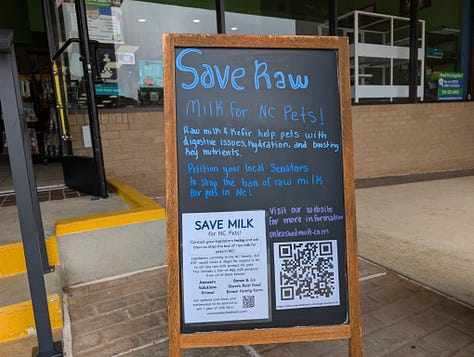Raw milk bans removed from farm bill after grassroots opposition, controversial provisions remain
Interviews w/ local famers + pet store owner
Provisions which would have repealed the currently available means of selling and distributing raw milk have been removed from the final version of the 2025 Farm Act after attracting grassroots opposition, including from two farmers and a pet store owner interviewed by the Triangle Trumpet.
Although the initial version of Senate Bill 639 did not include any reference to raw milk, the version of the bill approved by the Agriculture, Energy, and Environment Committee included an additional section which would have banned the "herdshare" distribution of raw, unpasteurized milk, an arrangement in which the participants purchase a "share" of a dairy herd, and receive a portion of the milk produced.
The bill was further amended in the Judiciary Committee to retract the ban on herdshares and instead ban the distribution of "pet milk" for nonhuman consumption, with an additional subsection added to order the Agriculture and Forestry Awareness Study Commission to "study the advisability of allowing the dispensing of raw milk via herd share arrangements and the retail sale of raw milk and raw milk products."
Ultimately, the Senate passed a version of the bill which dropped the study, while also leaving the current laws regarding the distribution of raw milk unmodified.
Colby "Bear" Hammonds
However, the bill still contains two disputed provisions, sections 17 and 19, which would respectively modify the Department of Agriculture and Consumer Services law enforcement officers and establish additional liability protection for pesticide manufacturers.
"By adding an additional role of law enforcement, it's going to create a situation of distrust between the farmers and the agency that's supposed to regulate them or help them out," said Colby "Bear" Hammonds, a multi-generational farmer and former candidate for Commissioner of Agriculture, in an interview at the farm where he lives in southern Wake County
."Currently right now we have school kids that come out on our farm about once every two months to take a tour of our farm; on many occasions I've invited North Carolina Ag representative extension agents out on my farm to assist with these kids and actually educate them on the process," continued Hammond.
"If this law passes, farmers like me are going to be less likely to openly invite North Carolina Department of Agriculture commission agents out on our farm out of fear of possibly being arrested for something we don't know or some regulation or that we anticipated."
Hammonds also addressed the limiting of liability for pesticide manufacturers: "The way it's written it it will cover over 15,000 different pesticides we use on our crops, our fields, our livestock. It also covers pesticides that sprayed in our homes for insects it also covers flea collars for our dogs any type of ointments you put on your dog skins."
"The fact that they're trying to create some type of immunity to prevent us being able to sue them is just crazy to us," Hammonds warned. "There's a lot of outside organizations that have come into the state of North Carolina in the last two months to try to push this bill through."
JP Phinney
JP Phinney, who founded and owns the Unleashed chain of pet stores with his wife Amy, sat down with the Triangle Trumpet at one of their eight Triangle locations to discuss the importance of the raw milk they sell for pet consumption.



"The main thing that gets us really worried about it is in some of the situations where it's used, there's no alternative, like when you have pups that are separated from their mother," explained Phinney. "They cannot have pasteurized milk—it has to be raw—they won't tolerate pasteurized."
"Every protein has amino acids that make it up...Some of those are still present after pasteurization, but they're out of balance," Phinney continued. "Raw milk also has naturally occurring bacteria like Bifidobacterium that's in there, Lactobacillus...but it's cooked out completely in a pasteurized product in the interest of safety."
Chad Wilkins
The Triangle Trumpet also headed up to Seven Season Farms in Granville County to meet with Chad Wilkins, who spoke about returning to his family farm and getting into the business of producing high-quality raw milk.



"I grew up on this farm, so this has been in our family for four generations, now five generations," said Wilkins. "My wife and I had opportunity to come here, and the first thing we did was start with a milk cow; we started selling it, and found out we could produce a product better than what we had gotten at a lot of farms. Cleanliness is kind of a key thing when it comes to raw milk, and we were funny about that: keeping it cold is pretty critical."
"The challenge with herd shares is that not everybody wants to be locked in to having to pick up milk every week," explained Wilkins, describing the pros and cons of the two sales avenues currently allowed by law. "We never oversell the herd shares because those people have paid for their month ahead of time, so we wanna make sure that their milk is there."
"We never offer more than about half of what we get in a day as herd shares...the other half we offer is pet milk," continued Wilkins. "Now, am I gonna say that everybody who gets that pet milk is using it for their pets? Probably not, but a number of them are, and they tell us that they are, so I believe them."
"I don't understand why we're demonizing a raw food product and giving chemical companies, multi-billion dollar companies immunity from litigation."

